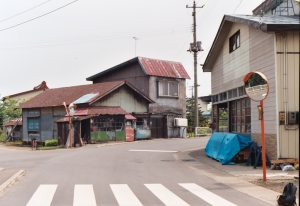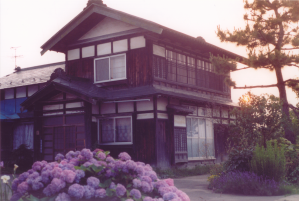Tracting

Intersection at a small village near Kanagi |
The biggest need in rural Japan is simply for people to hear about
Jesus and for relationships to be built that can bring people to the
churches. Rural Japan is far less open to the Gospel than the
cities, in part because there are a large number of elderly who are set
in their Shinto-Buddhist ways. Another barrier is simply the
geography. A single town is not usually large enough to support a
church, so anyone going to a church is likely to need to travel some
distance to attend church or any outreach functions at the church. The train system is not very developed in the rural areas and a car is
required to drive to the church, which limits the number of children,
poor, and wives with husbands who are not happy about involvement at
church.
A large part of our work was with the Kanagi Chapel, doing tracting in
the surrounding villages. Kanagi is a small, about 4000 person
village thirty minutes north of Itayanagi. The Chapel there, which
is a member of the Tsugaru Gospel Church, has about five members and its
own pastor, Makoto TAKASE. Takase-
sensei‘s
passion is reaching these small farming communities, so we spent about
three days a week passing out flyers to peoples’ mailboxes (
posuto).
1 Putting things in people’s mailboxes is not illegal in Japan and it is
a fairly common method of announcement (assuming that the organization
has more available labor-time than money for stamps).

Traditional Japanese house. Taken in Itayanagi. |
Finding the
posuto is not
necessarily so easy, especially for one with Western
sensibilities. Japanese houses traditionally have their backside
facing the road, so getting to the “front” door involves walking up the
driveway to what we would consider their backyard. Sometimes the
posuto is on the outside of the
house, but often it is inside a sort of glass porch, so you have to open
up the sliding glass doors, and and then look for it
. This always unnerved me,
because it felt like I was walking into someone’s backyard univited,
opening their back porch door, and surrepticiously putting something
into their mailbox. Occasionally the owner would be home, in which
case you said
gomen kudasi
(please excuse me) and explain what you were doing if your Japanese were
sufficient. I think you were supposed to ask if you could put the
flyer in their mailbox, but since my Japanese did not permit that, I
simply finished my introduction, hoped they did not have any questions
(since I could not understand them), hand it to them, saying
douzo.

Small town near Kanagi Village |
Our reception was much different than we would receive in the
U.S. Although some people refused, most people took the flyer and
looked at it (even after we introduced ourselves as from the Kanagi
church). Still, at first I felt that we were telling people what
they did not want (or care) to hear. Perhaps we were. But we
were also truly ambassadors for God, giving these people one of the few
chances to hear God that they have received. Maybe no one would
come in response to the flyers, but how else can we proclaim God? It is through relationships that people come to know God and, as yet,
the church has no relationships in these villages.
For the first two weeks we did tracting, we handed out flyers to an
evangelistic meeting at the chapel where a well-known television
evangelist would speak; after that we simply handed out flyers
introducing the chapel. The evangelist meeting was well attended,
with somewhere upwards of thirty people. Of those, all were
Christians except for three non-Christians. On one hand, three
people after handing out 2000 flyers is a pretty low return
(.15%). On the other hand, it was 10% of the total attendance, and
it is three fledgling relationships that the church now has. Is it
worth six days of passing out flyers to introduce three people to the
church? I would say yes!
1 posuto is a transliteration of the
British word “post”, as in “parcel post”. The u is very short, so
the word sounds more like “possto”.


